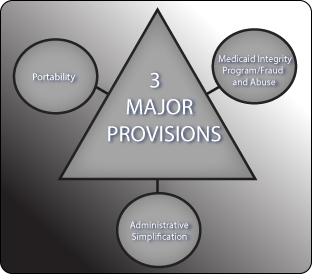Request a Free Consultation
3 Major Provisions

The Health Insurance Portability and Accountability Act (HIPAA) of 1996 contains the following three major provisions:
Portability
Medicaid Integrity Program/Fraud and Abuse
Administrative Simplification
The portability provisions provide available and renewable health coverage and remove the pre-existing condition clause, under defined guidelines, for individuals changing employers and health plans.
The Medicaid Integrity Program (MIP) guarantees that the Centers for Medicare & Medicaid Services (CMS) has a funding source for integrity activities and expands its authority to hire anti-fraud contractors.
The administrative simplification provision implemented standard transaction and code sets, identifiers, security, and privacy rules across the healthcare industry.
Administrative Simplification Requirements of HIPAA
The major requirements of administrative simplification affect:
Transactions and code sets – Establishes standards for electronic transactions and external medical data code sets Identifiers – Establishes a standard for a unique employer identifier and a standard for National Provider Identifiers (NPIs).
 Security – Specifies the administrative, technical, and physical requirements for covered entities to use in safeguarding protected health information.
Security – Specifies the administrative, technical, and physical requirements for covered entities to use in safeguarding protected health information.
Privacy – Establishes a set of national standards for the protection of certain health information; addresses standards for the use and disclosure of individuals’ health information (called “protected health information”); outlines standards for individuals’ privacy rights, as well as individuals’ rights to understand and control how their health information is used.
The complete suite of HIPAA Administrative Simplification Regulations can be found on the Health and Human Services (HHS) website at hhs.gov.
The following entities are affected by the HIPAA administration simplification requirements:
All health plans, including Medicaid, Medicare, and commercial plans Providers that transmit or store health information electronically Healthcare clearinghouses






